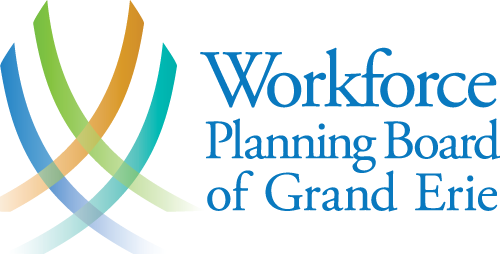The Workforce Planning Board of Grand Erie conducts labour market research and planning to support workforce development in the communities of Brantford, Brant, Haldimand, Norfolk, Six Nations and New Credit. This work helps local employers, educational institutions; employment and community partners build the skilled workforce needed for economic prosperity.
What is Local Labour Market Information?
It is research and data about the job market, workforce trends and the economy in Grand Erie.
Why is it important?
Having timely, fact-based data about local trends allows the Workforce Planning Board of Grand Erie to identify labour force issues and challenges in our community.
What is the process?
The Employment Planning Advisory Committee (EPAC) is formed from representatives across the region from each municipality including members from business, education, Employment Ontario Network, municipal staff, government representatives and media.
Each year, EPAC carries out the research and consultation process that helps identify the multiple challenges affecting both employers and job seekers including:
- Prioritizing the top 3 – 5 issues affecting our communities’ workforce and economy
- Identifying research and information gaps
- Developing 3-4 workforce development activities that can be moved forward during 2020- 2021
- Determining key performance indicators to measure effectiveness
- Helping distribute and communicate the plan to our communities
Additionally, in 2020-2021 the Grand Erie COVID-19 Recovery Task Force – a sub-committee of EPAC – has been assembled to identify various Grand Erie economic recovery scenarios and develop strategies to respond efficiently and effectively to the impacts of the pandemic.
EPAC met this week to discuss the Local Labour Market Plan for Grand Erie in 2021. Working groups from the committee recently held a series of community consultations and established priorities for 4 key areas – Skills Development, Education, Business Supports and Economic Development.
Priorities for Education:
- Enhance student education around career pathways
- Find new ways of engaging/involving parents/families about education and career pathways as early as primary grades.
- Broaden the scope of experiential learning
- Increase integration of digital skills training and technology into core courses
- Strengthen connectivity between career counsellors and industry professionals
Priorities for Skills Development:
- Increase digital/technical skills development
- Design and deliver Human Resources training for employers
- Develop transferable skills training curriculum
- Support soft-skills training within the workplace
- Align labour market information (LMI) with skills training focuses
Priorities for Business Supports:
- Advocate for forgivable loans and grant programs
- Identify business needs in key sectors
- Increase promotion of skills training programs
- Advocate for affordable and attainable housing
- Share insightful labour market data
Priorities for Economic Development:
- Advocate for adjustment of legislation to allow employers more flexibility
- Increase financial support for new cleaning protocols
- Support industry network development
- Design digital inclusion supports for residents & employers with limited internet access
- Develop a consistent “one-stop shop” for information and resources
To learn more or to contribute your input, contact us.









